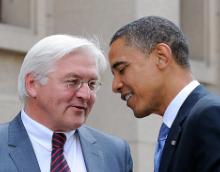The excitement -- however artificially stimulated by opening rock bands and generously inflated crowd estimates -- of Barack Obama's speech in Berlin is now passed. What remains are some serious questions: notably, for German Foreign Minister Frank-Walter Steinmeier and the Mayor of Berlin, Klaus Wowereit. The two leading Social Democrats -- both touted as possible candidates for the chancellorship in the 2009 German elections -- were also the two politicians most closely associated with the push to have the American presidential candidate give a high-profile public speech in the German capital.
It is a well-established principle of international law that states are not supposed to interfere in the internal affairs of other states. Some would now claim that this "principle of non-interference" has in practice -- notably since the Kosovo War -- been modified to permit foreign interventions in the case of severe human rights violations. But no one -- not even the German jurists and diplomats who have pressed for a "loosening" of the principle -- claims that it allows of any other exceptions.
The U.N. General Assembly's "Friendly Relations" Declaration of 1970 recognizes a "duty not to intervene in matters within the domestic jurisdiction of any State" and it lays down that "No State or group of States has the right to intervene, directly or indirectly, for any reason whatever, in the internal or external affairs of any other State." The "Friendly Relations" declaration is the General Assembly's authoritative gloss on the guiding principles of international law briefly enumerated in article 2 of the U.N. Charter. The assembly has passed numerous subsequent resolutions specifically affirming the applicability of the norm to national elections as, so to say, the internal affair par excellence. (See here, for instance.)

